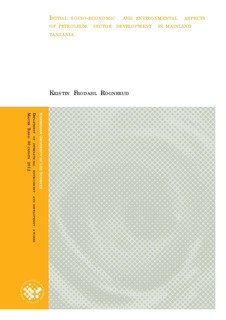Initial socio-economic and environmental aspects of petroleum sector development in Tanzania
Master thesis
Permanent lenke
http://hdl.handle.net/11250/187838Utgivelsesdato
2012-11-09Metadata
Vis full innførselSamlinger
Sammendrag
Recent gas discoveries made in the south-eastern parts of Tanzania indicates a huge
potential for gas reserves in the country. President Kikwete has expressed expectations that
petroleum resources could lead to a resource blessing for the country. However, the
designated blocks for exploration and drilling activities are located in sensitive marine
environments, which are important for the livelihoods of the country’s coastal communities
and biodiversity.
This study provides an initial analysis of socio-economic and environmental aspects of
petroleum sector development in Tanzania, with a special focus on the coastal areas where the
industry’s activities are mainly located. Attention has been focused on institutions, companies
and petroleum-related assistance programs that are involved in the Tanzanian petroleum
sector, and how rights and responsibilities are shared between these. Six Tanzanian
institutions, one Norwegian petroleum company, two assistance programs and one investor
corporation were investigated. Accordingly, their roles and responsibilities were assessed to
better understand how petroleum management is characterised by certain features, rules
devised to constrain actions, institutional attributes and interactions.
To explore the interrelationship between social and natural systems, several
underlying factors were analysed that may increase or decrease the vulnerability and
resilience of petroleum development in the coastal system. Corruption, wealth inequalities,
disregard for people’s rights and lack of regulations were considered as factors that may
compromise the resilience of the system. In addition, factors that may enhance or detract
robustness from key institutions were analysed to better understand the robustness of the
management system. This involved issues of funding, infrastructure, and access to financial
and human resources.
Overall, the thesis scrutinises the early developments of gas and oil development in
Tanzania, and related socio-economic and environmental challenges and opportunities. By
drawing upon examples from countries with long histories of petroleum (Norway and
Nigeria), the study offers a brief analysis of the overarching objectives of resource and
environmental management, the ecosystems under management and the institutions involved
in or granted a standing in resource decisions.
